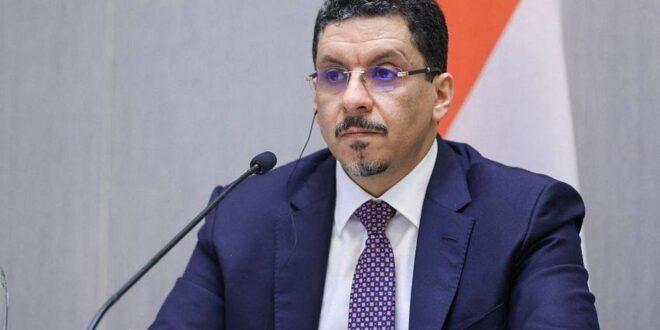Yemen’s Houthis are exploiting the security of the Red Sea for internal propaganda purposes, warned Foreign Minister Ahmad Awad bin Mubarak, emphasizing that the group’s actions have no connection to supporting Palestinians.
Mubarak, speaking to Asharq Al-Awsat, reaffirmed the Yemeni government’s commitment to continue engaging in Saudi-led peace efforts.
Despite Houthi mobilization and escalation on all fronts, he stated that the government remains committed to de-escalation and ceasefire.
A French frigate recently shot down two drones over the Red Sea that were believed to be approaching from the coast of Yemen.
“The interception and destruction of these two identified threats” were carried out late on Saturday by the frigate Languedoc, which operates in the Red Sea, the French military said in a press release on Sunday.
With this development, Paris joins US and British forces in attempting to counter Houthi threats without engaging in open confrontation with the group.
On his part, Mubarak underscored the condemnation by Yemen’s Presidential Leadership Council (PLC) of the Houthi militias’ use of the Red Sea security for the sake of domestic media propaganda.
He clarified that the reality of these actions has no connection to supporting Palestinians.
Simultaneously, the top Yemeni diplomat expressed the solidarity of the Yemeni government and people with the Palestinian cause, condemning the brutal Israeli aggression in Gaza and the West Bank.
Mubarak called for an immediate ceasefire and punishment of the Israeli occupation for the crimes, violations, and atrocities committed in Palestine.
The US accuses Iran of fully backing Houthi attacks in the Red Sea, Arabian Sea, and Gulf of Aden—a stance deemed “unacceptable” by the US State Department.
National Security Advisor Jake Sullivan asserted that there is every reason to believe that despite the Houthi involvement, these attacks were fully enabled by Iran.
Observers note that the Houthis, seizing on the Gaza conflict, exploit it as an opportunity to divert attention from its internal crises, disrupt peace efforts, and attempt to whitewash its crimes against Yemenis.
The group has recently escalated its threats, extending beyond Israeli-linked vessels to target international ships in the Red and Arabian Seas. This move marks a shift from previous warnings limited to ships with ties to Israel.
A spokesperson for the US State Department recently told Asharq Al-Awsat that the ongoing Houthi militant attacks on commercial ships in the southern Red Sea flagrantly violate international law and pose a significant threat to global trade, as well as regional stability.
Addressing peace efforts and their latest developments, Mubarak clarified that the Yemeni government’s peace vision centers on addressing the core of the conflict, not just its aftermath.
The minister emphasized commitment to the three agreed-upon references: the Gulf Initiative and its implementation mechanism, the outcomes of the Comprehensive National Dialogue Conference, and relevant UN Security Council resolutions, especially Resolution 2216.
Regarding his recent meeting with US Special Envoy to Yemen Tim Lenderking, Mubarak noted that they reviewed “developments related to the political process aimed at ending the war and bringing peace to Yemen.”
The minister also reiterated support for the efforts of the PLC and the Saudi-led Arab Coalition, as well as the initiatives led by Lenderking.
“The Yemeni government is fully engaged in peace efforts, committed to de-escalation and ceasefire, despite the mobilization and escalation led by the Houthi militia on all fronts of the conflict,” said Mubarak.
When asked about developments in Lenderking’s recent visit to the region, Mubarak confirmed discussions zeroed on Yemen’s situation and the latest developments in Saudi mediation efforts, emphasizing a commitment to a genuine political process for lasting, comprehensive peace based on national, regional, and international references.
“The US envoy affirmed the welcoming and supportive stance of the US administration towards the efforts of Saudi Arabia in achieving a lasting peace agreement in Yemen,” clarified Mubarak.
He underscored the importance of leveraging available opportunities to advance conflict resolution, prevent a return to hostilities, and mitigate the humanitarian crisis in Yemen.
Discussions also centered on US efforts and coordination with nations supporting the principle of free navigation for secure global shipping.
Mubarak emphasized the need to ensure the flow of goods and international trade in the Red Sea.
Recently, Washington imposed sanctions on 13 individuals and entities responsible for facilitating the transfer of tens of millions of dollars from the sale of Iranian goods to support Houthi terrorist militias, aided by Iran’s Quds Force, the foreign arm of the Revolutionary Guard.
 Ministry of Foreign Affairs and Expatriates Official Web Site
Ministry of Foreign Affairs and Expatriates Official Web Site
